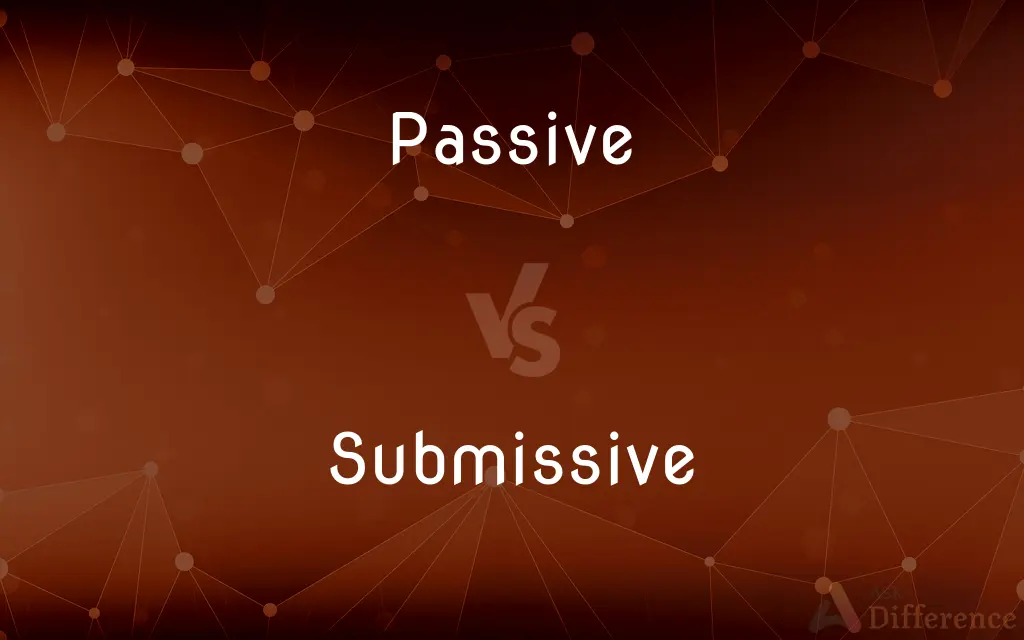Passive vs. Submissive — What's the Difference?
By Tayyaba Rehman — Updated on October 25, 2023
Passive implies lack of action or reaction, while submissive denotes willingly yielding to authority. Both indicate non-resistance, but submissive often involves a choice or intent.

Difference Between Passive and Submissive
Table of Contents
ADVERTISEMENT
Key Differences
The term "passive" primarily describes an absence of action or response. When someone is passive, they might not engage, react, or take initiative in a situation. On the other hand, "submissive" relates to a person's demeanor of yielding or surrendering to another's will or authority. It implies a conscious decision or tendency to allow others to take control.
In relationships or group dynamics, a passive individual might not voice opinions, not necessarily out of fear or respect, but due to indifference or reluctance. Conversely, a submissive person might withhold their opinions out of respect, fear, or a desire to please another party. Their silence stems from an active choice to let another lead or dominate.
From a linguistic perspective, passive can describe a voice in grammar where the subject is acted upon, rather than doing the action. For instance, "The ball was thrown by John." In contrast, submissive doesn't have a grammatical role but carries its behavioral connotation across contexts.
In day-to-day scenarios, someone might be passive by not participating in a discussion merely because they are disinterested. Meanwhile, a submissive individual might avoid participating because they believe another person's view or authority should prevail. Both passive and submissive behaviors can be observed in various contexts, but the underlying reasons for such behaviors mark their distinction.
Comparison Chart
Primary Definition
Lacking action or reaction.
Willingly yielding to authority.
ADVERTISEMENT
Underlying Reason
Often indifference or reluctance.
Respect, fear, or a desire to please.
In Relationships
Might not engage due to disinterest.
Might not engage out of deference to another.
Grammatical Role
Describes a voice where the subject is acted upon.
Doesn't have a specific grammatical role.
In Group Dynamics
May not voice opinions due to lack of interest.
May not voice opinions to allow another's dominance.
Compare with Definitions
Passive
Not reacting visibly to something that might be expected to produce manifestations of an emotion or feeling.
She remained passive during the heated debate.
Submissive
Lacking in assertiveness or in resistance to guidance or control.
In the face of opposition, he became submissive and withdrew his proposal.
Passive
Accepting or allowing what happens without active response or resistance.
He was passive and just let events unfold around him.
Submissive
Relating to a characteristic of being willing to be under someone else's control.
The submissive attitude of the apprentice was appreciated by the mentor.
Passive
Accepting or allowing what happens or what others do, without active response or resistance
The women were portrayed as passive victims
Submissive
Characterized by a tendency to yield to the will or authority of others.
His submissive nature made it hard for him to say no.
Passive
Denoting a voice of verbs in which the subject undergoes the action of the verb (e.g. they were killed as opposed to the active form he killed them).
Submissive
Ready to conform to the authority or will of others; obedient.
She was submissive to her manager's demands.
Passive
(of a circuit or device) containing no source of electromotive force
A passive optical network is to be installed in 2000 homes
Submissive
Showing a disposition to submit; subservient.
The dog was submissive and followed every command.
Passive
(of a metal) made unreactive by a thin inert surface layer of oxide.
Submissive
Inclined or willing to submit.
Passive
A passive form of a verb.
Submissive
Obedient or passive.
Passive
Receiving or subjected to an action without responding or initiating an action in return
The mind viewed as a passive receptacle for sensory experience.
Submissive
(BDSM) One who submits to a dominant partner in BDSM practices.
Passive
Accepting or submitting without objection or resistance; submissive
A passive acceptance of one's fate.
Submissive
(rare) One who submits.
Passive
Existing, conducted, or experienced without active or concerted effort
“Although tick paralysis is a reportable disease in Washington, surveillance is passive, and only 10 cases were reported during 1987–1995” (US Department of Health and Human Services). “[Many parents believe] that computers are educational and, at the least, less passive than television” (Laurie Hays).
Submissive
Inclined or ready to submit; acknowledging one's inferiority; yielding; obedient; humble.
Not at his feet submissive in distress,Creature so fair his reconcilement seeking.
Passive
Of, relating to, or being certain bonds or shares that do not bear financial interest.
Submissive
Showing a readiness to submit; expressing submission; as, a submissive demeanor.
With a submissive step I hasted down.
Passive
Of, relating to, or being a solar heating or cooling system that uses no external mechanical power.
Submissive
Inclined or willing to submit to orders or wishes of others or showing such inclination;
Submissive servants
A submissive reply
Replacing troublemakers with more submissive people
Passive
(Grammar) Of, relating to, or being a verb form or voice used to indicate that the grammatical subject is the object of the action or the effect of the verb. For example, in the sentence They were impressed by his manner, were impressed is in the passive voice.
Submissive
Willing to submit without resistance to authority; deferent
Passive
(Chemistry) Unreactive except under special or extreme conditions; inert.
Submissive
Abjectly submissive; characteristic of a slave or servant;
Slavish devotion to her job ruled her life
A slavish yes-man to the party bosses
She has become submissive and subservient
Passive
(Electronics) Exhibiting no gain or contributing no energy
A passive circuit element.
Passive
The passive voice.
Passive
A verb or construction in the passive voice.
Passive
Being subjected to an action without producing a reaction.
Passive
Taking no action.
He remained passive during the protest.
Passive
(grammar) Being in the passive voice.
Passive
(psychology) Being inactive and submissive in a relationship, especially in a sexual one.
Passive
(finance) Not participating in management.
Passive
(aviation) Without motive power.
A passive balloon; a passive aeroplane; passive flight, such as gliding and soaring
Passive
(electronics) Of a component: that consumes but does not produce energy, or is incapable of power gain.
Passive
Where allowance is made for a possible future event.
Passive
(grammar) The passive voice of verbs.
Passive
(grammar) A form of a verb that is in the passive voice.
Passive
(marketing) A customer who is satisfied with a product or service, but not keen enough to promote it by word of mouth.
Passive
(electronics) Any component that consumes but does not produce energy, or is incapable of power gain.
Passive
Not active, but acted upon; suffering or receiving impressions or influences; as, they were passive spectators, not actors in the scene.
The passive airUpbore their nimble tread.
The mind is wholly passive in the reception of all its simple ideas.
Passive
Receiving or enduring without either active sympathy or active resistance; without emotion or excitement; patient; not opposing; unresisting; as, passive obedience; passive submission.
The best virtue, passive fortitude.
Passive
Inactive; inert; unreactive; not showing strong affinity; as, red phosphorus is comparatively passive.
Passive
Designating certain morbid conditions, as hemorrhage or dropsy, characterized by relaxation of the vessels and tissues, with deficient vitality and lack of reaction in the affected tissues.
Passive
The voice used to indicate that the grammatical subject of the verb is the recipient (not the source) of the action denoted by the verb;
`The ball was thrown by the boy' uses the passive voice
`The ball was thrown' is an abbreviated passive
Passive
Lacking in energy or will;
Much benevolence of the passive order may be traced to a disinclination to inflict pain upon oneself
Passive
Peacefully resistant in response to injustice;
Passive resistance
Passive
Expressing thatthe subject of the sentence is the patient of the action denoted by the verb;
Academics seem to favor passive sentences
Passive
Of or relating to a grammatical voice in which the grammatical subject is subjected to the action of the verb.
In the sentence A song was sung, the verb is in the passive voice.
Passive
Lacking in energy or will; lethargic.
He took a passive role in the group project.
Passive
Not participating readily or actively; inactive.
She was a passive member of the club, rarely attending meetings.
Common Curiosities
What does passive mean?
Passive refers to a lack of action, reaction, or resistance.
How is submissive defined?
Submissive denotes willingly yielding to the authority or control of others.
Is being passive the same as being lazy?
Not necessarily. Being passive means not reacting, while laziness implies an aversion to work or effort.
Is passivity always negative?
Not always. In some contexts, being passive might be strategic or beneficial.
Does submissive have a role in grammar like passive does?
No, submissive doesn't have a specific grammatical role like passive does.
Can someone be both passive and submissive?
Yes, an individual can display both traits, though the underlying reasons might differ.
Are these terms used differently in psychological contexts?
Yes, psychologists might delve deeper into the underlying reasons for passive or submissive behaviors.
Does submissive always imply weakness?
No, being submissive can be a conscious choice and doesn't always denote weakness.
Are passive people always submissive?
No, one can be passive due to indifference, while being submissive often involves a decision to yield.
In what scenarios might someone choose to be submissive?
They might do so out of respect, love, fear, or a desire to maintain harmony.
How is the passive voice used in grammar?
In the passive voice, the subject is acted upon rather than performing the action.
Do passive people always avoid conflict?
Often, yes, passive individuals might avoid confrontations due to their non-reactive nature.
Can being submissive be empowering in some contexts?
Yes, choosing when and to whom one is submissive can be a form of personal agency.
How can one move from being passive or submissive to more assertive?
Building self-confidence, practicing assertive communication, and setting boundaries can help.
Can cultures influence passive or submissive behaviors?
Definitely. Cultural norms and values can shape how these behaviors are manifested and perceived.
Share Your Discovery

Previous Comparison
Stakeholder vs. Client
Next Comparison
Orangery vs. GreenhouseAuthor Spotlight
Written by
Tayyaba RehmanTayyaba Rehman is a distinguished writer, currently serving as a primary contributor to askdifference.com. As a researcher in semantics and etymology, Tayyaba's passion for the complexity of languages and their distinctions has found a perfect home on the platform. Tayyaba delves into the intricacies of language, distinguishing between commonly confused words and phrases, thereby providing clarity for readers worldwide.
















































